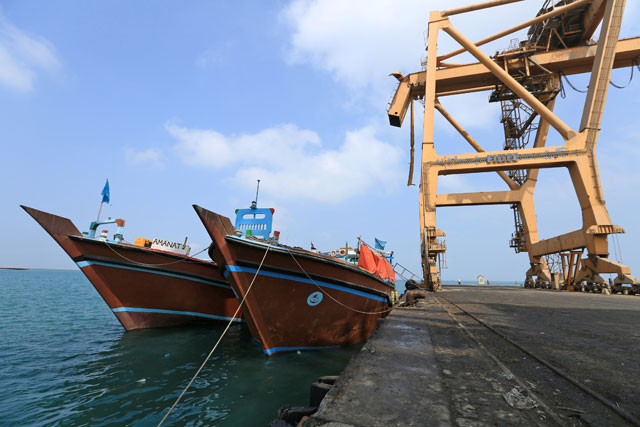MOKHA, Yemen — Hodeida Port, Yemen's largest entry point for aid, is now in the crosshairs of the Saudi-led coalition which is intent on cutting off the Houthi rebels from alleged Iranian arms shipments.
The Red Sea Port has been a point of contention in Yemen's war since Saudi Arabia and its allies intervened on behalf of the government in 2015.
It is the main conduit for humanitarian aid on which millions depend, as Yemen teeters on the brink of famine.
But for neighbouring Saudi Arabia, Hodeida is seen as the entry point for rebel weaponry — which it accuses regional rival Tehran of supplying.
On Tuesday, a spokesman for the Saudi-led coalition blamed the Shiite rebels for a "deliberate" attack on a Turkish ship loaded with wheat shipments.
Investigations revealed that "a missile had pierced the hull of the ship", Turki Al Maliki said.
The United Arab Emirates — a key member of the Saudi-led alliance — on Wednesday said its military had destroyed two rebel boats, "which had threatened a commercial oil tanker in the Red Sea".
The coalition points to incidents like these to support allegations the Houthis are using Hodeida as a strategic military outpost and entry point for ballistic missiles.
In November 2017, the coalition announced a total blockade on Hodeida in response to a rebel ballistic missile attack that targeted the Saudi capital Riyadh.
That embargo was eased under international pressure, but the coalition has meanwhile set its sights on retaking Hodeida by land — especially as rebel missile attacks have increased.
Mine fields
The United Nations has warned that any operation aimed at seizing Hodeida itself would disrupt the entry of aid shipments to Yemen, 70 per cent of which flow through the rebel-held port.
But since May, the United Arab Emirates has taken the initiative to ramp up the coastal offensive, with the stated goal of taking Hodeida.
The fighting has been fierce, slowed by landmines that Yemeni military sources say have been laid by the insurgents.
The front lines have moved up along the coast, and there are also fronts in the districts of Hays and Al Jarahi further inland.
"Military operations are proceeding at a good pace," the exiled Hodeida Governor Al Hassan Tahir told AFP from his base in Mokha.
About 180 kilometres south of Hodeida, the Red Sea Port of Mokha was seized by Yemeni government forces in February.
"We have progressed in some areas more than 20 kilometres," said Tahir.
He acknowledged, however, the difficulty of advancing through minefields and avoiding civilian casualties.
"We are ensuring that our forces do not operate in areas where there is a high density of civilians," he said.
In mid-May, Amnesty International said the coastal offensive was driving tens of thousands of people from their homes.
The rights group warned "the worst could be yet to come" after surveying civilians who made the perilous escape from front line towns south of Hodeida Port.
The offensive is now just 70 kilometres outside Hodeida in some areas, military sources told AFP.
The battles are sporadic but deadly.
Last week, 64 rebels and 19 loyalist troops were killed in the span of 24 hours, according to medical sources.
On Tuesday, 26 Houthi fighters and nine soldiers died in clashes.
Anti-Iran coalition
The UAE, in setting Hodeida as a target, has no choice but to project a united front among a disparate collective of forces.
The "Giant Brigades" — a former elite force of the Yemeni army, rebuilt by the UAE — has been at the vanguard of the offensive, reinforced by thousands of fighters from southern Yemen.
The second key force, the "National Resistance", are loyalists of Yemen's ex-president Ali Abdullah Saleh, who was assassinated by his former Houthi allies in December.
The force is commanded by Tarek Saleh, nephew of the former strongman, who in April linked up with the Saudis and Emiratis — though without pledging allegiance to Yemen's exiled president, Abed Rabbo Mansour Hadi.
The third force, the "Tihama Resistance", is named for the Red Sea coastal region and made up of locals from the area loyal to President Hadi.
National Resistance spokesman Sadiq Dawid has dismissed talk of divisions between the allies.
"We are fighting side by side with the Giants Brigade and the Tihama Resistance, and we are all in a joint operations room under the umbrella of the Arab alliance," he said.
"We are committed to participating in the fight to rid Yemen of Iran's agents," he added.
The fighting in western Yemen is now the fiercest in the impoverished Arabian Peninsula country.
Nearly 10,000 people have been killed since the alliance launched its intervention in March 2015, contributing to what the UN has called the world's worst humanitarian crisis.
